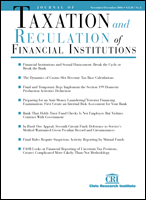Derivatives Trading Orders: Protecting the Debtor’s Trading Business from Bankruptcy Termination
Author: Mark Speiser.; Harold Olsen.
Source: Volume 19, Number 06, July/August 2006 , pp.5-10(6)

next article > |return to table of contents
Abstract:
One of the most important tools of chapter 11 reorganization is the bankruptcy trustee’s ability to assume favorable contracts while rejecting those that are not. Generally, a trustee or a debtor-in-possession enjoys these powers notwithstanding the existence of contractual provisions known as “ipso facto clauses” that purport to give the non-bankrupt party the right to terminate the relevant contract upon the occurrence of certain bankruptcy- or insolvency-triggered defaults or termination events. In the case of derivative contracts, such as forward contracts, swaps, securities and commodities contracts, and repurchase agreements, Congress, to minimize volatility in the financial markets, created exceptions to that general rule. While few would quarrel with the goal of enhancing financial market stability, in the real world these statutory provisions have the potential, by permitting counterparties to terminate, liquidate, or accelerate upon bankruptcy, to impair the bankruptcy reorganization of a company whose business is largely predicated on such derivative contracts. Beginning with the Mirant bankruptcy filed in 2003, debtors have sought to implement systematic programs to preserve their trading business by providing incentives (1) for existing counterparties to continue to do business under existing contracts, and (2) to induce existing or new counterparties to enter into new, postpetition derivative contracts with the debtor. The following describes the approaches taken in the Mirant bankruptcy (and subsequently in the Calpine bankruptcy) in attempting to maintain the value of the debtors’ trading books.Keywords:
Affiliations:
1: Stroock & Stroock & Lavan LLP; 2: Stroock & Stroock & Lavan LLP.